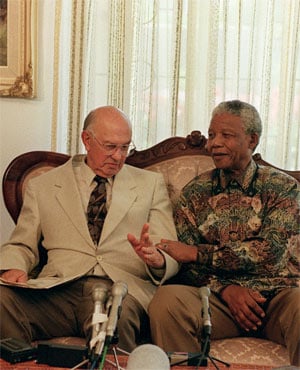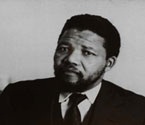
It was their first face-to-face meeting after years of requests from behind bars by Mandela, and spadework by those progressives who were close to Botha.
In a memorandum to Botha in March 1989, Mandela wrote that "majority government and internal peace were two sides of the same coin" - they had to talk.
But it was politically dangerous - each feared that the willingness to talk of a "fascist and racist" on one side, and a "communist and terrorist" on the other, would be perceived as weakness. It was a bloody era - a white flag would denote the loser.
All the same, when Botha sent a message to Mandela on 4 July, to be ready at 05:30 the following morning for his journey to Tuynhuys, it was scarcely six weeks before Botha would himself be ousted by those within his own ranks. Mandela was ready, in a new suit.
Until the day he resigned as president on 14 August 1989 because of a vote of no-confidence by the Cabinet, Botha fought tooth and nail against communism. When he met Mandela that Wednesday morning it was for an "informal discussion" and not "negotiation".
Mandela tense about meeting
Discussions between Mandela and a secret task team of the Special Cabinet Committee (SCC) had begun in May 1988, but the public was blissfully unaware of this. In Botha's eyes Mandela was a communist, the prophet of a "devilish" ideology that wanted to force white South Africans to their knees.
In his autobiography Long Walk to Freedom, Mandela wrote that he was tense about seeing Botha.
"He was known as die Groot Krokodil (the Great Crocodile) and I had heard many accounts of his ferocious temper. I resolved that if he acted in that finger-wagging fashion with me, I would adjourn the meeting."
He was picked up early that morning from the house in which he lived at Victor Verster Prison in Paarl, by the commander of the prison, Major Marais.
"No, Mr Mandela, your tie," Marais remonstrated, and helped Mandela to retie it in a double Windsor knot. "I had little use for ties in prison," Mandela wrote years later.
After breakfast at the home of General WH Willemse, the small convoy carrying Mandela pulled discreetly into the underground garage at Tuynhuys.
Waiting inside were minister of justice Kobie Coetsee, head of the National Intelligence Agency (NIA) Dr Niel Barnard, and prison officials. Mandela was asked to avoid controversial issues during his rendezvous with the head of state.
On the thick carpets of Tuynhuys, the magnitude of the moment was almost tangible. Barnard quickly knelt down and tied Mandela's shoelace, which had come loose.
And then the door opened.
As if perfectly rehearsed, Botha met him precisely in the middle of his plush office, Mandela wrote in Long Walk to Freedom. He expected the worst, but Botha was "courteous, respectful and friendly".
No unconditional release
They spoke about South African history; of the Afrikaner rebellion in 1914 and how Mandela saw this as parallel to the struggle. They posed for a photograph that would be published exclusively in Die Volksblad many years later.
According to Botha, Mandela said he hoped the National Party (NP) would win the election on 6 September, "even though he was opposed to everything the NP stood for". They also talked about the Afrikaner's ties with the country, that this group had nowhere else to go and that they could play an important role in forging a peaceful solution in South Africa.
In spite of the head of state's smiles, he rejected Mandela's request for the unconditional release of all political prisoners and himself.
This was despite years of pressure from many quarters to free the man who had become a political icon, and the thwarted hope of an estimated 300m TV-viewers worldwide that Botha would announce this step in his Rubicon speech at the Natal congress of the NP on 15 August 1985.
1989 was Botha's 28th year in the Cabinet and Mandela's 27th in prison.
"The longer he stays there, the more of a legend he becomes. His death in prison would have very damaging consequences for the prospects of peaceful change in South Africa," British premier Margaret Thatcher said in 1988.
But Botha had a reputation of never bowing to the pressures of sanctions, public opinion and especially the media.
The US Anti Apartheid Act (1985) and the visit of the eminent persons of the Commonwealth to persuade Botha to share power were all in vain - he was solid as a rock.
Warped channels
In Botha's biography, Stem uit die Wildernis (Voice from the Wilderness) by Dr Daan Prinsloo, a good part focuses on various offers made to Mandela to "buy his freedom".
Botha made a sixth conditional offer in Parliament on 31 January 1985: Mandela (and other political prisoners) would be freed on condition that they "unconditionally rejected violence as a political instrument".
"It is therefore no longer the South African government that bars Mandela's road to freedom, but he himself," Botha said at the time.
And so began a dialogue between Botha and Mandela, through these warped channels. Early on, Mandela refused the offer as "lukewarm and half-baked". Even before he replied, ANC veteran Oliver Tambo said "the government should know that Mandela's life is ruled by strong principles".
On 10 February 1985, in front of a jubilant crowd at the Jabulani stadium in Soweto, Zindzi Mandela read her father's response. For the first time in 20 years the words of Nelson Mandela could once again be heard legally in South Africa.
"What freedom am I being offered if the ANC is still banned? What freedom if I can be arrested for contravening the pass law, must ask for permission if I want to enter an urban area, (and) if my South African citizenship is not respected?
"Only free (people) can negotiate; prisoners cannot enter into contracts - I cannot and will not give (the government) any undertaking at a time when I and you, the people, are not free. Your freedom and mine cannot be separated. I will return."
Mandela challenged Botha to show that he was different from his predecessors. He put the onus on Botha to find a way out of their impasse:
"Let him renounce violence. Let him say that he will dismantle apartheid. Let him unban the people's organisation, the African National Congress and free all (political prisoners)." "I cherish my own freedom dearly... But I cannot sell my birthright, nor am I prepared to sell the birthright of the people to be free."
PW Botha stumbled on the banks of his Rubicon. For this reason, many remember him as the president who in difficult circumstances did not have the courage to cross the boundary to free Mandela.
A scheduled visit to President Kenneth Kaunda of Zambia in 1989 by NP leader FW de Klerk, amongst others, sparked an already explosive situation between the head of state and the Cabinet - Botha wasn't informed and he reacted angrily.
'Good-natured relationship'
He accused the Cabinet of allowing Kaunda to "trap" them into negotiating with the ANC. "You're being too hasty, too hasty," was his parting remark to his Cabinet on 14 August 1989.
But according to Mandela, Botha crossed his Rubicon on the day of their meeting (at Tuynhuys).
Years later, Botha was very upset when it transpired that the only tape recording of his 5 July meeting with Mandela had been destroyed by the NIA.
Although Botha refers to the meeting in an impersonal way, his biography states that their "good-natured relationship" after that day, was one of the oddities of the new South Africa.
After his release, Mandela visited Die Anker, Botha's Wilderness home, a few times.
And although his freedom was in Botha's hands for 11 years from the time Botha was sworn in as prime minister in 1978, Mandela remained the reconciler towards Botha.
After visiting Die Anker with (former defence force chief) Constand Viljoen on 21 November 1995, President Mandela said to Botha:
"We must not force a solution. I would like to remember you for the role you played in the South African history. We . . . have made tremendous progress. We have fought our battles, but it is now the time for working, and to build. The leadership of this country must think with their brains, and must suppress the feelings in their blood . . . "I look upon you in that capacity. Let us not arouse the tigers in the different nations."




 Publications
Publications
 Partners
Partners






















